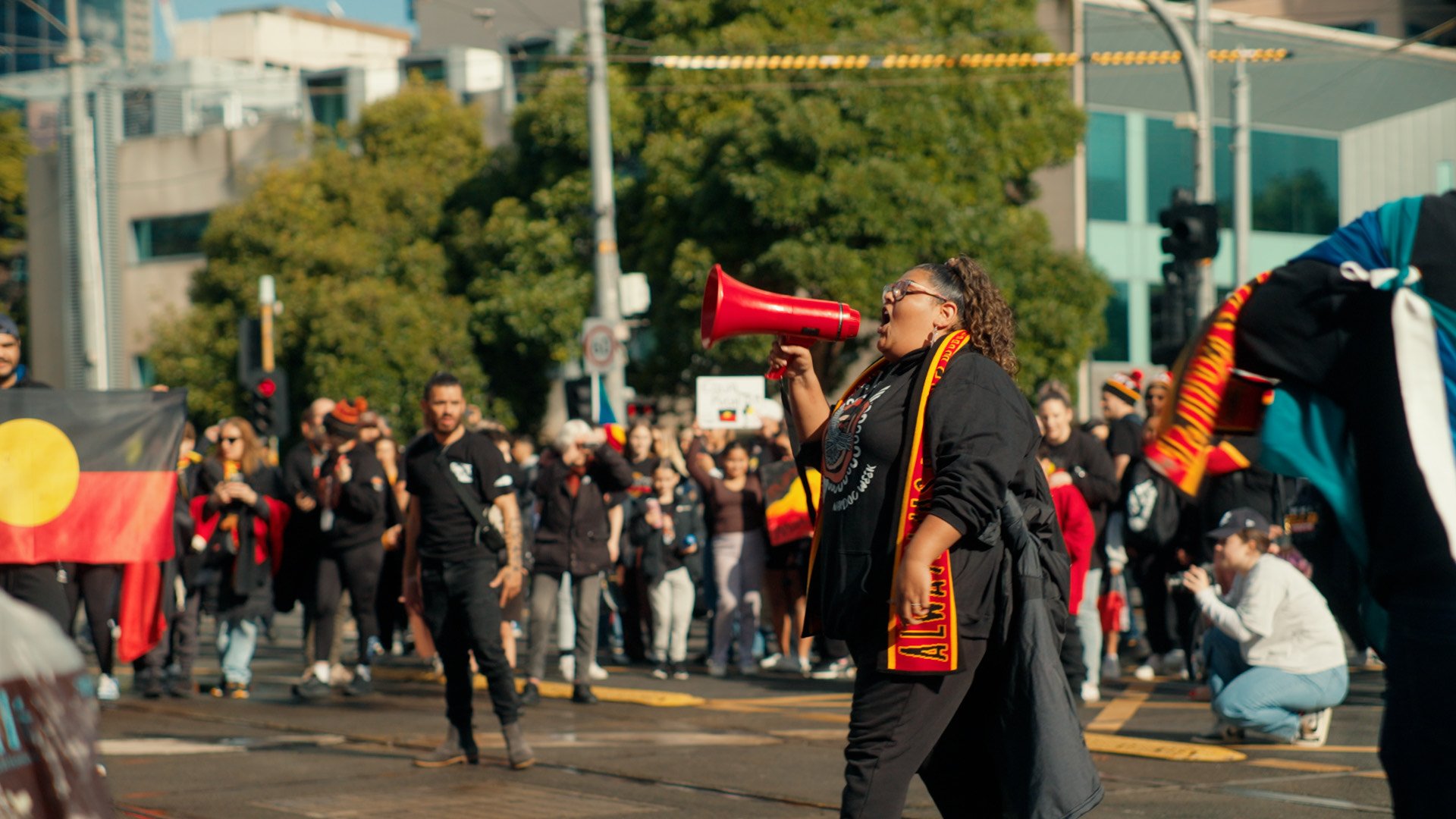The purpose of screening Motherhood in the Colony is to foster a shared experience of healing, learning and collective action.
As a Screening Host, the below information forms part of the agreement you make to ensure that Motherhood in the Colony will be shared in a way that aligns with its themes, cultural sensitivities and responsibilities.

Impact Goals
Indigenous sovereignty is realised, embodied and enacted across the globe
As a Screening Host, we require you to commit to using Motherhood in the Colony as a tool to help achieve the storytelling projects Impact Goals:
Amplify Indigenous voices – elevate First Nations and Palestinian voices by ensuring their lived experiences, perspectives, and histories are at the forefront
Challenge colonial narratives – use storytelling, education, and media to disrupt dominant colonial frameworks and create accessible entry points into solidarity movements defending Indigenous justice and self-determination.
Foster cross-cultural solidarity – engage audiences in meaningful dialogue and action that strengthens connections between First Nations, Palestinian and Arab communities, and allies.
Enable Indigenous sovereignty & self-determination – position Motherhood in the Colony as a tool for truth-telling, collective healing, and long-term movement-building in the pursuit of decolonisation.
Drive engagement & action – encourage audiences to participate through hosting their own screenings, supporting advocacy efforts, donating to First Nations & Palestinian organisations, and sharing resources.
Core Messages
Motherhood as a force for change:
◈ The film highlights the unwavering strength, resilience and nurturing power of mothers and matriarchs, and their critical roles in shaping families, communities and broader movements for justice.
◈ It underscores the importance of intergenerational knowledge transfer, where mothers and grandmothers pass down stories, traditions and values to the next generation.
Connection to Country and land as a source of identity and healing:
◈ The film explores the deep and spiritual relationship Indigenous peoples have with their lands, waters and skies.
◈ It demonstrates how connection to Country provides strength, belonging and healing in the face of historical and ongoing injustices.
◈ Country is portrayed not just as a physical space but as a living entity – Mother Earth – that sustains and nurtures all beings.
Truth-telling and solidarity:
◈ The film draws parallels between the experiences of First Nations people in so-called Australia and Palestinian people, highlighting shared histories of dispossession, resistance and resilience.
◈ It underscores the importance of global solidarity in the face of colonial oppression and ongoing struggles for self-determination and justice.
◈ The film amplifies the voices of First Nations and Palestinian women to reclaim narratives, confront colonial legacies, and drive systemic change, emphasising their roles as changemakers in their respective movements.
Duty of Care Commitments
To ensure the core messages of Motherhood in the Colony are conveyed respectfully and that all storytellers and people involved are treated with care, the following commitments must be upheld:
Respect for storytellers and communities:
◈ The storytellers featured in the film, as well as their families and communities, must be treated with the utmost respect during screenings and discussions.
◈ No content from the film may be used out of context or in a way that misrepresents the stories shared.
Cultural sensitivity and accuracy:
◈ All promotional and post-screening discussions must align with the cultural integrity of the film’s messages and themes.
◈ Facilitators and panellists must approach discussions with sensitivity to the historical and emotional weight of the issues raised in the film.
Privacy and wellbeing of participants:
◈ Panelists, particularly storytellers or representatives of impacted communities, must have the option to preview any questions or topics in advance.
◈ Personal and emotional safety should be prioritised for all involved, including the audience, especially individuals from impacted communities.
Community inclusion and representation:
◈ Palestinian and First Nations people, and other impacted communities, must be given priority in discussions, ensuring their voices are centered and amplified.
◈ Screening events should aim to foster dialogue, build understanding and strengthen relationships between Palestinian, First Nations, and other Indigenous and non-Indigenous audiences.
Facilitation of safe spaces:
◈ Screening organisers and facilitators must ensure the event provides a safe space for open, respectful dialogue.
◈ Acknowledge the potential emotional impact of the film and provide resources or pathways for support if needed.
Thoughtful promotion of the event:
◈ Be mindful of where and how the event is promoted, considering the potential for negative reactions or racism in certain communities.
◈ Avoid promoting the event on platforms or in spaces where it may incite harmful or discriminatory behaviour, particularly in conservative spaces.
◈ If unsure about appropriate promotional channels, consult with us for guidance.
Acknowledgement of Country:
◈ Wherever you are in the world, take time to recognise the Indigenous peoples whose lands you’re gathering on, and the histories, sovereignties and ongoing struggles held in those places, and their enduring connections.
By adhering to these duty of care commitments, screenings of Motherhood in the Colony will maintain the safety and cultural integrity of the film and its messages while creating spaces for respectful dialogue and collective learning.
A Bukjeh and GARUWA Film
In association with Common Ground
Principal Partners
Supported by
Incubated by Unquiet Impact Distribution Lab
















